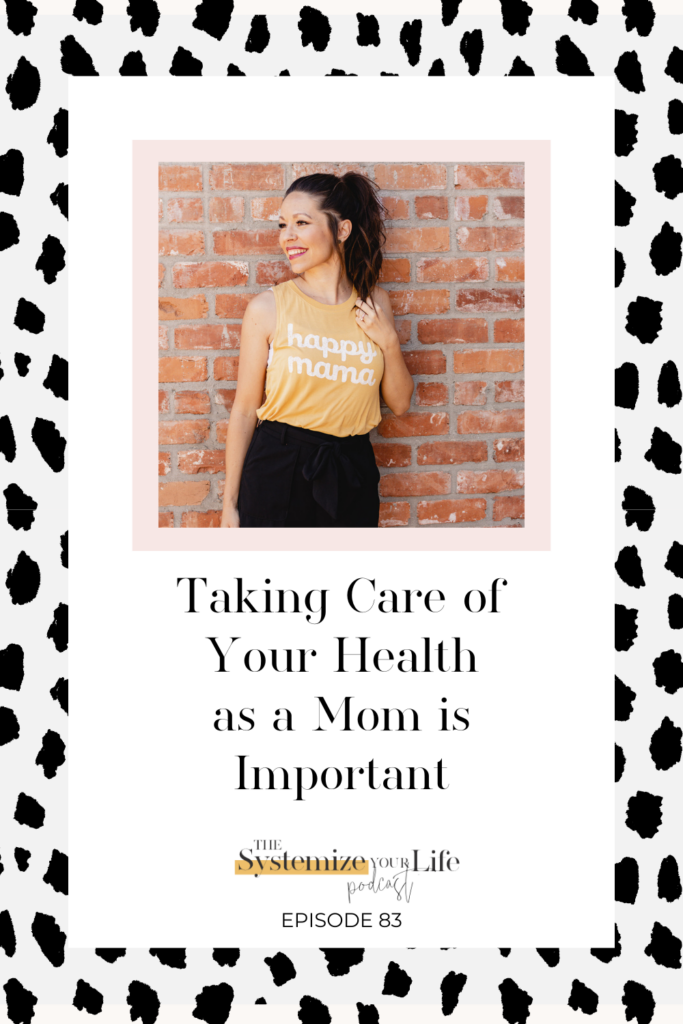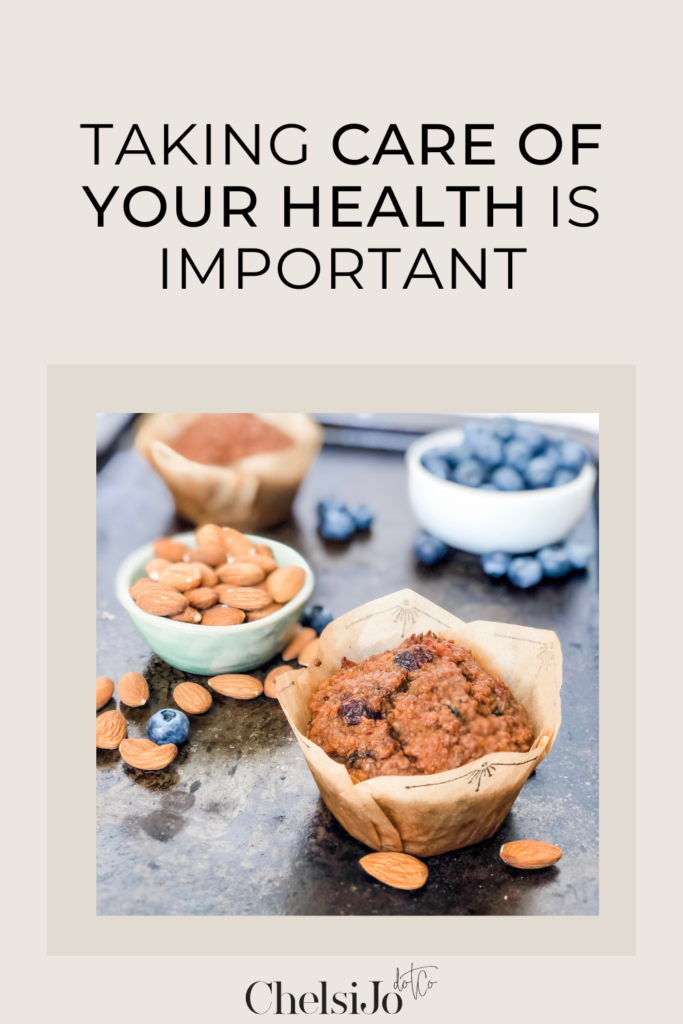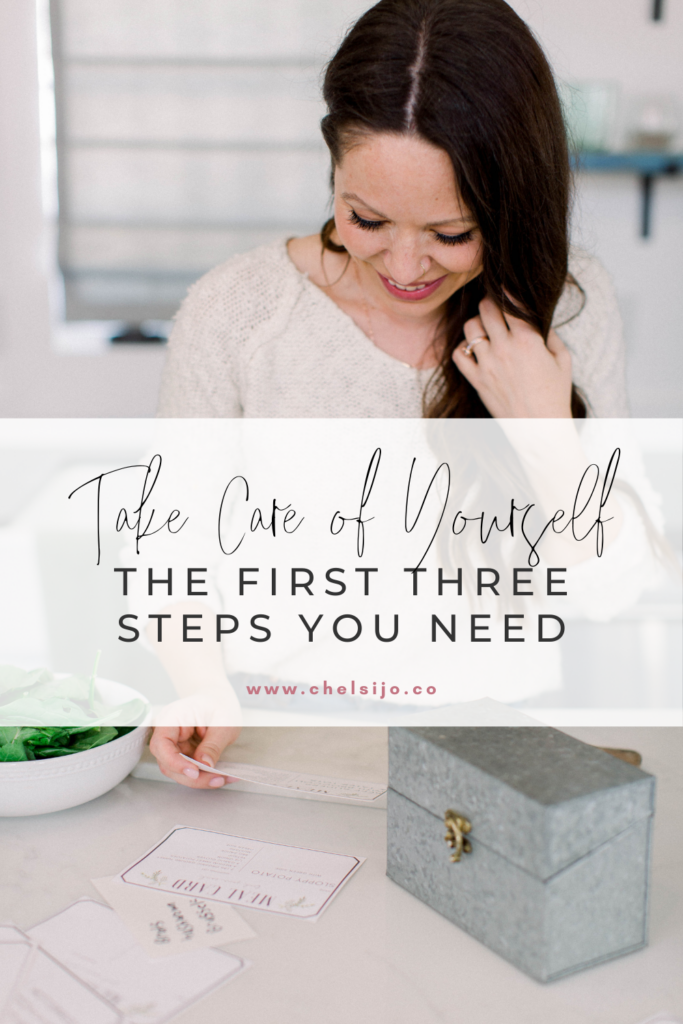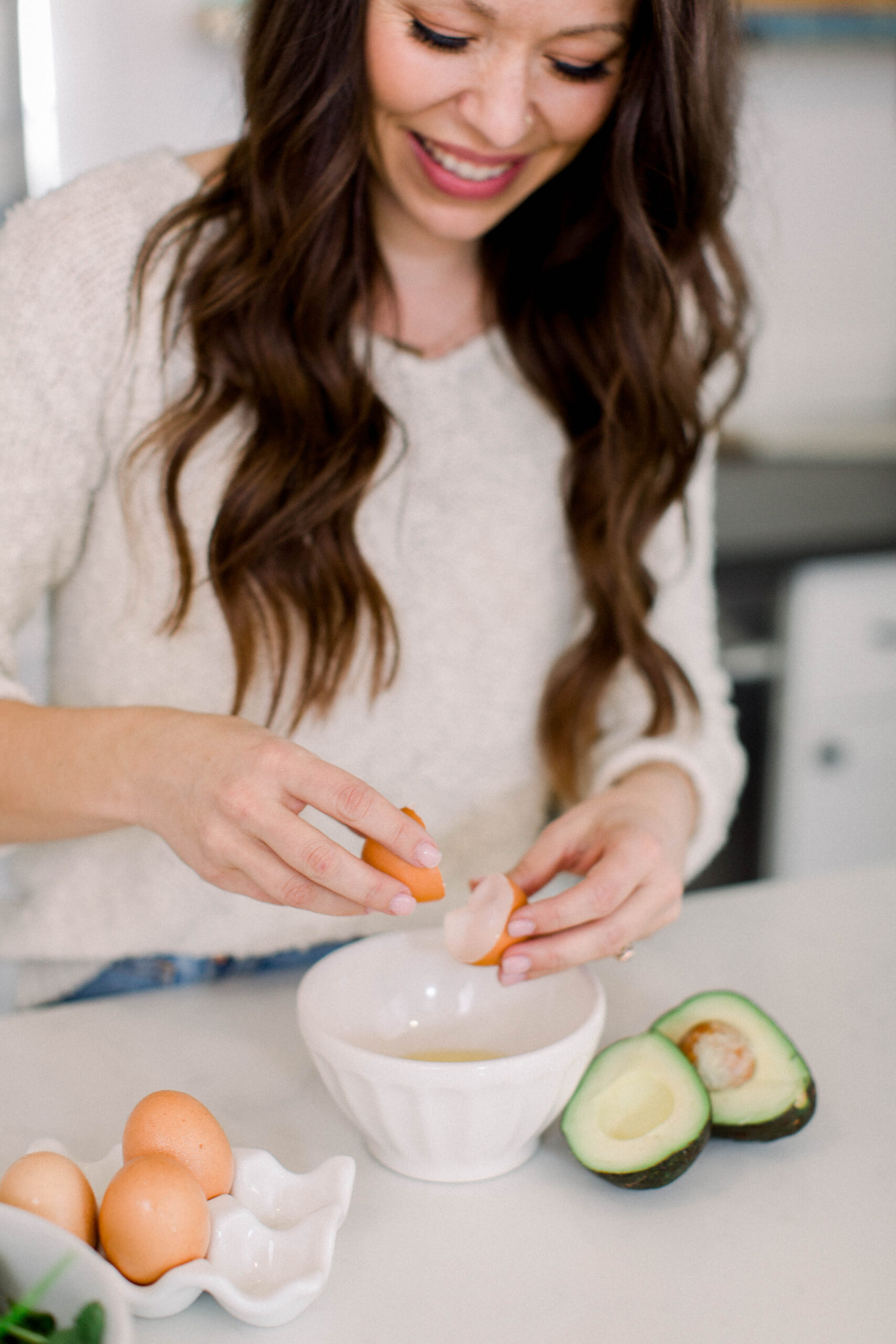Our culture doesn’t place a high priority on taking care of your health if you are a mom. There is the expectation that your children, husband, and other people in your life matter more and taking the time to care for yourself is considered selfish. This has a devastating effect on moms who are trying their best and struggling because their body needs care they’ve been told to ignore.
Listen below for the entire episode on The Systemize Your Life Podcast
Changing the Culture of Motherhood
If you know me by one thing from this podcast and blog, it will be my systems. But there is also this underlying crunchiness that some of you may already know. On the podcast, you will learn all things time blocking, productivity, and task management. I want you to know how to not feel pulled in all directions as you manage your home and business.
My mission is to change the culture of motherhood. This means not just how we take care of ourselves, but also how we take care of each other. How we take care of ourselves has to do with what do, but also what we put in and on our bodies, minds, and hearts. I want to share more about food here on the blog and podcast, so I decided to reach out to an expert to help. I found someone with the knowledge we need that also shares the vision I have for being a positive influence for change in the culture of motherhood.
Change in the Future Starts Now
If you aren’t a mother yet, please stick around. The information shared here will be great to know before you have kids. This entire post and corresponding podcast episode are how we as moms can take care of nourishing ourselves. It is so important. We believe mothers deserve to be well fed and supported in every aspect of their life.
We know that when mothers are fully nourished, they are able to show up for themselves, their family, and their business. If you hang out with me on Instagram, you know I’m constantly posting my food. I don’t drink coffee, the energy I have is from the food I put into my body, the sugar I don’t put in my body, the sleep I get, and the water I drink.
I know you will love learning from my guest on the podcast, so be sure to listen to episode 83 of the Systemize Your Life podcast for all the info on feeding your family nutrient dense, nourishing food and start taking care of your health today. Now, let’s jump into this special post and meet our guest!
Meet Varian Hans – Guest on Systemize Your Life Podcast
Varian Hans is a nutritional therapy practitioner. She has been working in the field for over 10 years and has also been working in the health and culinary world. Varian has an incredible mix of understanding and knowledge. All of this knowledge is used to coach moms, female entrepreneurs, and businesswomen as they are navigating their health after childbirth. After childbirth here doesn’t just mean the first few weeks or months, she means for years after.
Not only is she an amazing wealth of knowledge in her fields, she is also a mother. She understands that when it comes to nutrition, there is a huge focus on preconception and pregnancy, but nothing after baby is here. A lot of mothers aren’t sleeping well and are on edge. They are missing elements of their nutrition, which is deeply individualized.
Varian Understands That Taking Care of Your Health is Deeply Personal
On the podcast, Varian shares how she has first hand experience with this. She had a traumatic birth that she nearly didn’t survive. After the birth, she was diagnosed with post-partum depression and post-traumatic stress disorder (PTSD), which lingered over a year. Her lifeline back to herself, on top of the mental health support, was food. Food was the biggest way she supported herself.
Through that journey, Varian saw other women in her life with similar symptoms. She even saw it in women who did not have a traumatic birth experience. These symptoms were a commonality in simply becoming mothers and how that sets you up to not feel well.
Motherhood is Individualized, But Not Without Commonalities
I believe in the work that Varian is doing. A big part of my heart is what happens to women after they have children. Not every woman comes to motherhood thru pregnancy (adoptions, step kids, etc.) and all our situations are unique, but I want to acknowledge that what I see is that the moment a woman gives birth, something drastically changes.
The culture we live in does not allow women the time to heal. I saw this firsthand with my first birth. With my first daughter, I had to have my doctor write me a prescription that I could not go back to work at six weeks. I had to have that note that told my workplace that my mental health needed more time off to heal. I could have grinned and bared it, but it would not have been ideal.
With my second birth, I had begun to understand how important nutrition was. I chose to have a home birth and to focus on nutrition with that pregnancy. I had suffered from extreme IBS symptoms from the stress of a relationship I had left years ago and so nutrition was important to me.
Our instinct is to take care of our children, but as soon as they come out of our bodies, we are taught to neglect ourselves. I love, love, love that Varian teaches to pay attention to yourself. You can nourish your children more by taking care of yourself.
The First Three Steps to Start Taking Care of Your Health
This may all be new to you. You may have spent your whole life with the belief that considering yourself is selfish. First, I want you to stop that! You are worth taking care of. Period. End of story. Second, I want you to keep reading to see what Varian had to say when I asked her about her recommendations for the momma who is brand new to the understanding that nutrition and nourishing herself is so important.
1. Adjust Your Mindset
I know I say it a lot, but the way we think about things is so important. This was Varian’s first step and she had a lot of information to back it up.
Motherhood is Hard on a Body
The first step in shifting your mindset is understanding how becoming a mother impacts your body. Varian said it was important for moms to know about post-natal depletion, which means that the burden of being pregnant, giving birth, and then nourishing a baby through breastfeeding requires a tremendous amount of nutrients.
In pregnancy, women give about 10% of their own mineral stores, typically from the bones, to their children in utero. We all come to motherhood depleted regardless if the pregnancy or birth was hard. The symptoms we experience are a spectrum, but one of the most common is brain fog or mommy brain. It is that feeling of being forgetful and not quite like yourself. Another issue is the hormonal imbalances that often occur. Or maybe you find yourself really wired or really stressed, but you don’t really know why.
You Are Not Alone or Crazy!
Varian used a great analogy to help explain this further. She said to think of your health like a plastic bag full of water. Throughout your life you encounter things like trauma or health problems and these cause pin prick holes and the water level (your health) starts to lower. Then you have a child and breastfeeding, sleepless nights, and stressful days all start to add up and poke a lot more tiny holes. It takes a while to patch these holes up to make you feel whole again.
This process can take up to ten years! So understand this, you are not crazy. You are not imagining it. But you do have to figure out what your body needs so you can start taking care of your health and see healing begin.
Three Ways to Change Your Mindset
Now that you understand what has happened, you need to take steps to change the way you think about taking care of your health. Here are three ways to do that:
- Decide that you are worthy of being taken care of. You understand that self-care, slowing down, and asking for help are important. It is not a sign of weakness to ask for help, so do it. Decide to ask for help with the laundry, dishes, or watching the kids so you can nap or do whatever it is that your body needs you to do.
- Adopt the mindset that nutrition doesn’t have to be complicated or expensive. Start with eating foods your grandmother would recognize, whole foods like fruits and vegetables. Expand your palate and don’t get stuck in the mindset of eating the same thing over and over again.
- Remind yourself that perfection is not necessary. You don’t have to eat beautiful, gluten-free foods, grass-fed meat, or expensive oils all of the time. Find a balance that truly works for you. Give yourself grace, a takeout meal in a diet normally filled with lots of whole foods will be ok.
How Do I Get My Family Onboard?
I spent three years on a paleo/autoimmune protocol diet. This is a pretty restrictive diet. Luckily I grew up with a mom that was pretty hippie most of my life. She made my baby food, had an herb encyclopedia, and has a full force garden. All of this influenced me, but I also know that I’m not out here making liverwurst for my family. I have my own balance.
The biggest question I get in relation to not getting stuck in a rut eating mac and cheese with chicken nuggets is from moms who worry their family won’t like the other stuff. No one wants to make separate meals, so they find themselves wondering, “How do I do this?” How do I expand my palate and my family’s palate?
“Decide that you are worthy of being taken care of. Understand that self-care, slowing down, and asking for help are important. It is not a sign of weakness to ask for help, so do it. Decide to ask for help with the laundry, dishes, or watching the kids so you can nap or do whatever it is that your body needs you to do.”
2. Start Small
Often we are dealing with kids who only want fried junk foods and a hubby who wants meat and potatoes. Varian’s advice on how to deal with changing this is to start small.
Small Steps Still Lead Great Places
Don’t get stuck thinking you need to make drastic changes to make improvements. If you want these new habits to stick, you need to move slow and be ok with taking your time. Taking these steps will improve your health and make it an easier process:
- Read ingredient labels. Know what is in your food. You may find yourself surprised at just what is in the foods you love. Taking care of your health starts with knowing what goes in your body.
- Become mindful of the fats you are eating. A lot of the oils commonly used are hydrogenated (soybean, canola/rapeseed, etc.) and these oils are inflammatory. Over time they cause a cascade of inflammatory responses in your body. Switch them out for coconut, olive, and avocado oils, ghee (clarified butter), and actual butter (no buttery spreads).
- Swap ingredients. If you are using mayo, look for one that is made with avocado oil instead of one of the refined oils.
- Look for the least amount of ingredients. To reduce your processed foods, look for those that have less ingredients. Chicken nuggets that have 15 ingredients will be better than those that have 30 ingredients, regardless of what they are.
- Understand what placement in the ingredient list means. The first three ingredients make up the majority of that food product. If sugar is number one, maybe skip that item for one where sugar is third or fourth.
Don’t Do It Alone!
Talk with your family. Help them understand why you are making changes. Let them know that you are starting small to make little changes to add up to big impact. Explain that you want to better take care of your health so you can participate in the things they want you to participate in.
If you have picky eaters, look for resources like Feeding Littles to help you know how to expose them to new foods. For textures, meet them where they are. Varian shared an example of how she did that for her family. She made a casserole dish and instead of using bread crumbs on top, she used crushed up pork rinds that were fried in a good oil. It gave that crunchy texture without unwanted ingredients.
Give Yourself Grace
I want to say this again, give yourself grace. You are doing a great job! When taking care of your health means making a lot of changes, it can get overwhelming to try and do it all. Do not stress about doing it all at once. Maybe you are going to focus only on upgrading your fats, that’s great!
Let’s get “selfish” for a minute. What if you are just so depleted that making your family change is too much? What are some ways you can refill your body? It’s ok to just focus on that for a time, too.
Making Changes to Take Care of Your Health Isn’t a Diet
Before we move on to the final step from Varian, she had a great reminder that this isn’t a diet. Making these changes for your health is not a diet meant for a short time. Diets are restrictive and this is about opening up your options. This is about replacing what you are eating with something better.
You can start doing this by trying different stores. Look for farmers markets or stores that focus on more items from farmers. Read those labels not for the nutrition facts, but to know what ingredients you are putting in your mouth. This knowledge is for life, not a short term diet.
3. Hydrate, hydrate, hydrate.
Dehydration is the most common deficiency in the United States. We are chronically dehydrated. When you are made 75% of water and all your cells require it to function, this is a major problem. Being dehydrated by even 2% will bring symptoms of fatigue.
To combat this, you want to aim for 1/2 your body weight (lbs.) in ounces per day. So if you weigh 150 pounds, you want to drink 75 ounces of water every day to stay hydrated. The most common complaint when increasing water intake is much more frequent bathroom trips.
To understand why this happens, you need to understand how we absorb water. Lots of bottled, filtered, and even tap water is stripped of all its minerals. These minerals are called electrolytes and they allow our bodies to uptake the water and use it. So our water often isn’t effectively absorbed.
The good news is that fixing this is easy! Simply add a pinch of real salt (Redmond, sea, himalayan) to your glass of water. It should not taste salty at all, but it gives enough electrolytes to make it easier for our bodies to absorb the water. You can also try using Trace Minerals.
Two more things to remember about hydrating:
- If you are breastfeeding, the 1/2 your body weight in ounces is a minimum. You need more water.
- You can’t show up for your life dehydrated. Being dehydrated messes with your sleep, energy, and general well-being.
More Practical Help to Take Care of Your Health
We covered a lot of ground already in this post, but there is just so much goodness jammed into this podcast episode with Varian Hess. Be sure to give it a listen. Here are a couple more practical helps:
Look for resources like cookbooks for recipe ideas. While a diet like paleo or Whole30 can be helpful, it’s not something that Varian suggests as a long term solution for most people. However their cookbooks are a great place to find recipes using whole foods.
If you are new to cooking, try to find a book or even an online course on the basics. You can find courses to teach you the proper way to use a knife and how to chop, dice, or otherwise prepare vegetables.
How to Build Your Plate
Varian shared a simple formula for building a nourishing plate:
- 1 whole portion of protein. This can be animal or plant-based. If you are using plant-based, use beans and legumes instead of the fake meats available today. Animal protein has the added benefit of B vitamins which are super important.
- 1/2 of your plate should be vegetables. You can steam, roast, or lightly saute in a good oil.
- The remainder of your plate can be grains or starchy vegetables.
To properly nourish your body, you need protein, carbohydrates, vegetables, and a small amount of a good quality fat. The protein supports multiple functions in your body. Carbohydrates provide quick energy and should come from vegetables like sweet potatoes and potatoes or rice. Vegetables provide minerals, this includes leafy greens, roasted broccoli, or squash. The fat helps your body absorb all the nutrients.
Real Life Examples
All of this information may seem overwhelming, but it is doable and doesn’t have to be complicated. Let me tell you how I accomplish this every week. Four to five nights a week, I rotate the same vegetables with little variation: brussel sprouts, broccoli, asparagus, green beans, and avocados. I also will include a salad for those who will eat it. Sometimes we try something “new” like collard greens or rainbow chard, just to change it up.
Every night, I take whichever vegetable it is out of the fridge, chop it up, toss it in a cast iron skillet with some coconut oil and salt, cook it, and eat it. That’s it.
To make this a dinner, we add either a grain or a potato. When the family wants something different like pizza, I will make myself a big salad and toss some protein on top. That is how I take care of myself when no one wants to eat the way mom eats.
Another super simple hack that Varian shared is to grab a rotisserie chicken from the store. Pair that with a veggie you roast or cook in a skillet. If you have an InstantPot, you can make rice quickly. Make enough for leftovers and store them in the fridge. Then you have a base to top with a protein and veggie for quick lunches. Bonus nutrition points for using bone broth instead of water to cook your rice. It’s an automatic mineral and nutrient upgrade!
Taking Care of Your Health Doesn’t Need to Be Complicated!
Remember that. Taking care of your health doesn’t need to be complicated. Pick one of the tips that Varian shared and start taking those steps to feel better.
You can do this, momma! Remember to check in with us in the Facebook group for even more support. I’m rooting for you!


Frequently Asked Questions
I am so overwhelmed with where to start taking care of my health. Where do I start?
Varian Hans gives a lot of information in episode 83 and all of it will help you take care of your body. But I get it, momma! You have so much on your plate already that paying attention to what is on your literal plate feels like one more thing and you just might break if you take on anything else. Deep breaths. First, make sure you are drinking enough water each day. Then focus on reading labels so you can know what you are eating and where you are starting, changing those things can be next. Join us in the Facebook group to chat about your health journey with other mommas who GET it!


